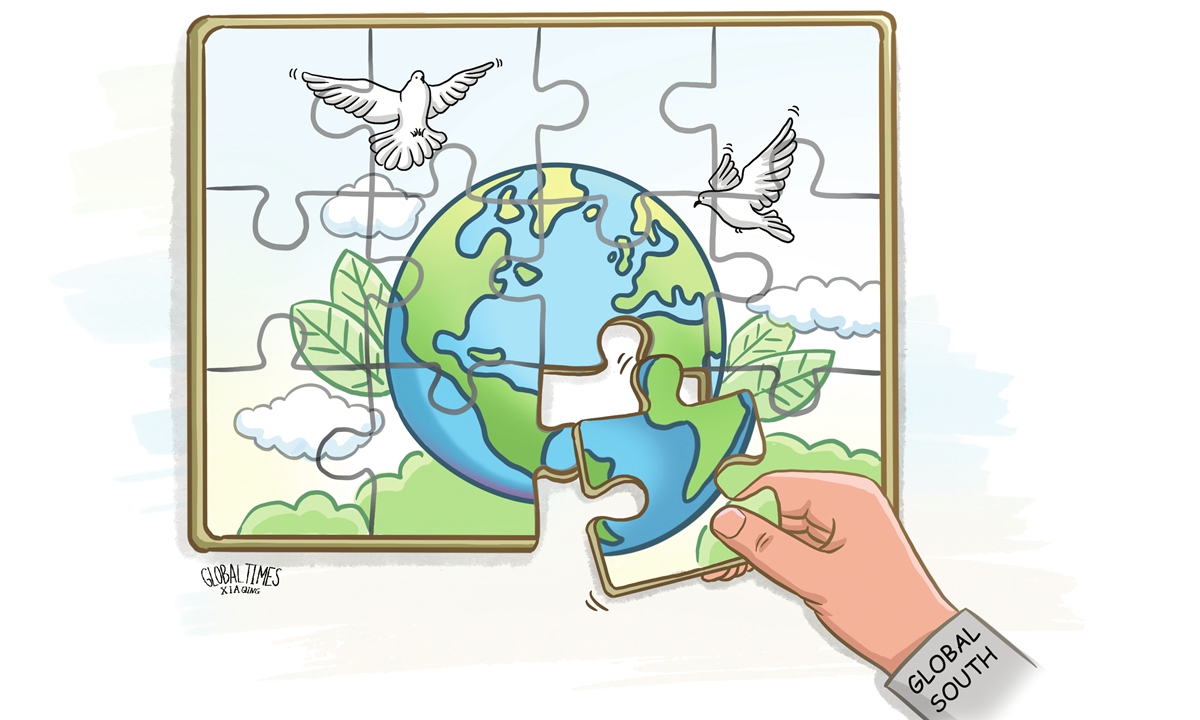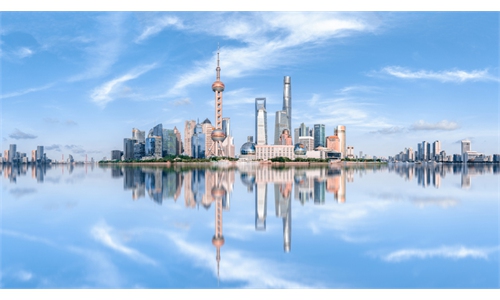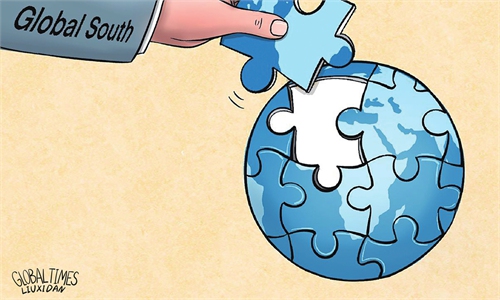
Illustration: Xia Qing/GT
There is a revolution brewing across the Global South. From Asia to Africa and Latin America, developing countries are creating a new geopolitical paradigm based on partnership, peace and progress. This movement away from the American-led world of disorder was ironically accelerated by the US' own aggression worldwide. The transformation toward a multipolar world, which made significant progress in 2023, will accelerate this year, making 2024 the year of decolonization.Looking at the big picture, the world has been dominated by European empires to varying degrees for 400 years, and then by the American empire since WWII. After the fall of the USSR, Americans thought their unipolar hegemony would last forever. However, they did not appreciate the potential of Asia or the inexorable cycles of history. Filled with hubris, the US deindustrialized itself, outsourced key sectors of manufacturing, financialized its economy, printed trillions of dollars, and engaged in perpetual wars. The delusion ended during the 2008 financial crisis, which revealed the American economy to be a Ponzi scheme propped up by the exorbitant privilege of the US dollar. The Global South watched in dismay but could not do anything since there was no alternative to the US and its rigged system.
However, nobody was ready for what happened next - the astonishing rise of China.
In 2009, China became the world's largest exporter, and in 2010, it surpassed Japan to become the world's second-largest economy. In 2011, China surpassed the US in patents, and in 2012, its middle class became the largest in the world. In 2013, China ranked first in e-commerce sales, in 2014, second in the stock market, in 2015, second in R&D spending, and in 2016, it became the largest economy in the world by PPP GDP.
However, given these achievements, the US began to exhibit anti-China hysteria and resorted to illegal and unethical tactics to contain China. These tactics include trade wars, tech wars and sanctions that violated WTO rules and the spirit of free trade. The US also supported a color revolution in Hong Kong and engaged in propaganda wars using Xinjiang separatists funded by the CIA. Additionally, the American media has coordinated a smear campaign against China's Belt and Road Initiative.
Furthermore, the US launched proxy wars in various parts of the world, with Syria and Ukraine being notable examples. The list of countries targeted for regime changes by the US in the last decade is long - Brazil, Bolivia, Venezuela, Thailand, Kazakhstan, Belarus and Pakistan, to name a few. Recently, the US has been bullying India as well, while claiming that its bilateral relationship with the country is the most consequential of this century.
As US whistleblower Edward Snowden revealed, the US brazenly spies on the leaders of European "allies." Consumed by a zero-sum attitude, American strategy for global primacy rests on disrupting Europe's relations with Russia and China.
The world has had enough. The last straw was when the US imposed shock-and-awe sanctions on Russia, expelled it from SWIFT, and confiscated $300 billion of Russian foreign exchange reserves. The Global South understood that the "rules-based order" had only one rule: America will do anything it takes to impose full-spectrum dominance over the world.
Thus, in 2023, tectonic changes unraveled in geopolitics. The détente between Saudi Arabia and Iran - brokered by China - followed by their admission into BRICS, was a game changer. The era of divide-and-rule was over. Dozens of more countries are poised to join BRICS+. The vision for a multipolar world is clear: cooperation as sovereign partners, focus on infrastructure, economic development and mutually beneficial trade.
The era of colonization is over. Global South countries are actively embracing dedollarization. "Who decided dollar would be the trade currency?" asked Brazilian President Luiz Inacio Lula da Silva. There is no need for African countries to use the US dollar while trading with one another, said Kenyan President William Samoei Ruto to a thunderous applause from the audience.
Throughout history, the currency of the world's largest trading nation has enjoyed global status. Thus, the internationalization of the yuan should not surprise anyone. Already, about half of China's cross-border transactions are happening in yuan, which has also surpassed the Euro in global trade invoicing and the Japanese yen in SWIFT transactions. When OPEC countries start selling oil for yuan, it will mark the beginning of the end for the Petrodollar.
In terms of military power projection, the US empire will be perceived as a "paper tiger" and ineffectual in 2024. In Ukraine, despite all the financial, military and propaganda support from US/EU/NATO, it's widely believed Russia has almost won the war. The victory will be confirmed in 2024.
In the Middle East, the US faces a lose-lose situation. It can either start a disastrous regional war and bomb Gaza, Yemen, Lebanon, Syria and Iran all at once, or concede defeat. The rational choice of a two-state solution is still unthinkable in the echo chamber of Washington.
The next decade will determine the great power game and the evolution of the 21st century, but 2024 will be a pivotal year.
The author is a geopolitical analyst, columnist, blogger, podcaster, and writer based out of Bangalore, India. His work can be found on Substack, X and more. opinion@globaltimes.com.cn


